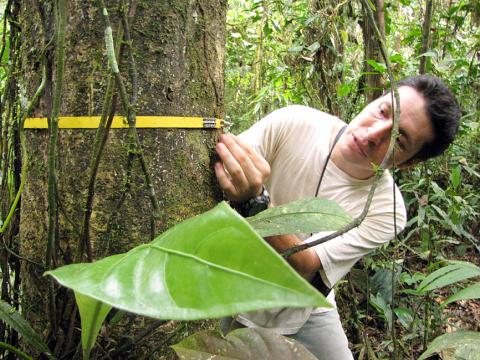The world’s largest tropical forest actually contains a lot of the same kinds of trees, according to research on the Amazon published this week in the journal Science.
Researchers embarked on an ambitious endeavor to catalogue the types of trees seen most often in the vast Amazon basin, which spans parts of Brazil, Peru, Colombia, Guyana, Suriname and French Guiana.
There are about 390 billion individual trees in this expanse known as greater Amazonia, which covers an area about as large as the continental US.

Photo: EPA
After compiling data from 1,179 forestry surveys, scientists discovered for the first time that the most common tree species in the Amazon is the palm Euterpe precatoria.
They also found that about half the trees in the entire rainforest come from just 227 tree species. The entire Amazon contains about 16,000 different tree species.
In other words, 1.4 percent of the total species make up about half the forest.
Researchers called these common trees “hyperdominants.” They include Brazil nut, chocolate, rubber and acai berry trees.
Some experts believe these trees are so common because they were actively cultivated by indigenous people who have inhabited the area for millennia.
Others, according to report co-author Nigel Pitman, a visiting scientist at the Field Museum in Chicago, “think those trees were dominant long before humans ever arrived in the Americas.”
The count also turned up new hints about rarities in the Amazon, suggesting about 6,000 tree species have populations of fewer than 1,000 individual trees.

Kehinde Sanni spends his days smoothing out dents and repainting scratched bumpers in a modest autobody shop in Lagos. He has never left Nigeria, yet he speaks glowingly of Burkina Faso military leader Ibrahim Traore. “Nigeria needs someone like Ibrahim Traore of Burkina Faso. He is doing well for his country,” Sanni said. His admiration is shaped by a steady stream of viral videos, memes and social media posts — many misleading or outright false — portraying Traore as a fearless reformer who defied Western powers and reclaimed his country’s dignity. The Burkinabe strongman swept into power following a coup in September 2022

‘FRAGMENTING’: British politics have for a long time been dominated by the Labor Party and the Tories, but polls suggest that Reform now poses a significant challenge Hard-right upstarts Reform UK snatched a parliamentary seat from British Prime Minister Keir Starmer’s Labor Party yesterday in local elections that dealt a blow to the UK’s two establishment parties. Reform, led by anti-immigrant firebrand Nigel Farage, won the by-election in Runcorn and Helsby in northwest England by just six votes, as it picked up gains in other localities, including one mayoralty. The group’s strong showing continues momentum it built up at last year’s general election and appears to confirm a trend that the UK is entering an era of multi-party politics. “For the movement, for the party it’s a very, very big

ENTERTAINMENT: Rio officials have a history of organizing massive concerts on Copacabana Beach, with Madonna’s show drawing about 1.6 million fans last year Lady Gaga on Saturday night gave a free concert in front of 2 million fans who poured onto Copacabana Beach in Rio de Janeiro for the biggest show of her career. “Tonight, we’re making history... Thank you for making history with me,” Lady Gaga told a screaming crowd. The Mother Monster, as she is known, started the show at about 10:10pm local time with her 2011 song Bloody Mary. Cries of joy rose from the tightly packed fans who sang and danced shoulder-to-shoulder on the vast stretch of sand. Concert organizers said 2.1 million people attended the show. Lady Gaga

SUPPORT: The Australian prime minister promised to back Kyiv against Russia’s invasion, saying: ‘That’s my government’s position. It was yesterday. It still is’ Left-leaning Australian Prime Minister Anthony Albanese yesterday basked in his landslide election win, promising a “disciplined, orderly” government to confront cost-of-living pain and tariff turmoil. People clapped as the 62-year-old and his fiancee, Jodie Haydon, who visited his old inner Sydney haunt, Cafe Italia, surrounded by a crowd of jostling photographers and journalists. Albanese’s Labor Party is on course to win at least 83 seats in the 150-member parliament, partial results showed. Opposition leader Peter Dutton’s conservative Liberal-National coalition had just 38 seats, and other parties 12. Another 17 seats were still in doubt. “We will be a disciplined, orderly